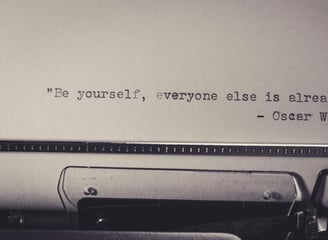A little about ghostwriting
You've come this far; now let's talk about what ghostwriting is and if it might work for you.




More about ghostwriting
If you ever read a nonfiction book that was a bestseller, then it's likely you've read a book that was ghostwritten.
Prince Harry's book Spare was ghostwritten, as was Michelle Obama's book, Becoming.
But lest you think that ghostwriting is something new that publishers cooked up a few years back, know that ghostwriting and ghostwriters have been helping others write for millennia.
In a way, even the Old Testament (the first half of the Bible) was, in a sense, ghostwritten because the books and stories were compiled, edited, and essentially written by two main scribes.
And yet, nowadays, anyone can hire a ghostwriter. You don't have to be a movie star or former president to do so.
What is ghostwriting?
Ghostwriting is when you hire a writer to write something for you. That something could be anything, but most often it's a book, especially a memoir.
True to the name, the ghostwriter’s own name usually does not usually appear on the cover, or anywhere in the book, for that matter.
Good ghostwriters are professionals with yeas of experience, and because of this, their services are not free, far from it.
Because of this, you should expect to pay anywhere between $20,000 and $70,000, or more, to hire a ghostwriter to help you write your memoir or other nonfiction book. That price varies depending on the book's length and the level of effort the project requires.
How much does it cost to hire a ghostwriter to write my book?






You can of course pay less, but if you do, you can't expect the same level of quality and experience. As the saying goes, all things being equal, you usually get what you pay for.
Want to know more about me, about ghostwriting, or if your story might make a readable books?
Just click the button below to book a quick chat!
A little bit about memoirs and why you might want to write one . . .






→
First off, what is a memoir, and is it different from an autobiography or a life story?
Great question. While all three, memoirs, autobiographies, and life stories, are about the person who is writing them, memoirs tend to focus on certain periods in that person's life and aren't necessarily an exhaustive (or exhausting) retelling of every event or year in that person's life.
Instead, memoirs focus on the high lights, and the low lights, of someone's life.
Autobiographies tend to be a bit more chronological in their structure and generally explain what happened to the author during every period in their life.
Life stories, on the other hand, tend to be shorter and highlight familial connections and experiences. So, where an autobiography or a memoir might run to 200 or 300 pages or more, a life story could run fifty pages, or even less. Life stories tend to be less detailed and seem to gloss over a lot of details but are great for including the author's main events in their life and their basic biographical information.
I fee that of the three, memoirs are the most interesting because they are the form that is also closest to narrative fiction in their structure.
In other words, a memoir attempts to tell a person's story and lead their reader along the path of discovering who that person was and why they did what they did.
How to write a great memoir . . .
As with writing a nonfiction book, there is no one magic secret to writing a memoir, but the following steps and tips can help you as you tell your story.
First, as when writing any kind of nonfiction book, make sure to plan, outline, and follow a process and schedule when writing your memoir. Visit this list of tips on how to write a book and make sure you follow all of those tips.
Second, don’t log every moment of your life in your memoir. Again, memoirs are really a best of in your life—a worst of as well, perhaps. When readers read a memoir, they want to read the highlights and lowlights of your life. These include your important events, accomplishments, turning points, as well as your major failures and disappointments. Sure, you will need to give them some background here and there and let them know where you are in your life for the chapter they’re reading, but strive to minimize or cut out all the mundane stuff in your memoir, because it doesn’t make for great reading.
Third, don’t be afraid to be personal and make yourself look bad. Yes, you can recount your victories, but you also need to recount your failures and mistakes, too. No one wants to read a book by and about someone who is perfect. How un-relatable! How boring! If you have an interesting experience or event in your life that was painful but that changed who you are or how you see things, include it even if it hurts to talk about it.
Fourth, and this applies to all writing, be specific in your writing. Don’t just say, I had a bad year, tell us why, if there are some interesting stories that illustrate why. Don’t just say, my dad was often unkind to me, tell us what he did and said. You will already have enough general statements in your writing, so make sure to include details to back up the generalities that necessarily
Fifth, memoirs are not a chance to get even. You may have plenty of people who did you wrong—most of us do—but your memoir is not the place to settle scores. Again, how boring, and how petty. Getting back at others through your memoir ruins the good energy that should permeate your memoir.
Sixth, and lastly, don’t forget that you are telling stories. We have all been to school when a substitute teacher took over for our regular teacher. And if your school was like mine, the kids often took control of the class for the sub and chaos often resulted. But when I was in elementary school, we had one sub who we all looked forward to whenever she showed up. Why? Because all she did all day was tell us one great story after another—she had dozens of them—and she knew how to tell us stories in her quiet, soft voice in such a way that we all settled down and just listened. Not everyone can do what she did in person, but when you’re writing your memoir, find and tell stories from your life, and write and rewrite them until they flow. Being aware that you are telling stories to a room of listeners will help you write a more compelling and readable memoir and will take your memoir to the next level.
Again, there are tons of other tips to writing a great memoir, but these six are a great start.
Want to know more about writing your memoir or how to write a memoir?
Click the button below to book a quick chat!



“I started working with Jonathan on my book right from the beginning. He helped me plan my book and was with me every step of the way, assisting in writing and editing it. Jonathan is a creative thinker and provided vital insights and expertise. He created a positive environment that multiplied my talents, and he saw the big picture of my book. And yet, he was able to drill down and add practical details that made it even better; If you need a professional who can get your vision, Jonathan is the right choice. He will make your vision come to life like he did mine, and you can trust him to deliver expert results. He helped me bring my story to life, and for that I am forever thankful. I strongly recommend Jonathan Williams.”
—Matthew House, Soldier and Spouse and Their Traveling House

“Jonathan helped us tell Zollie’s amazing life story. He gave us the guidance we needed and was with us every step of the way. I’m not sure we could have written our book without his help. We happily recommend Jonathan to anyone with a story to tell.”—
Zoltan and Annterese Toth, Freedom Keeper: the Life of Zoltan Toth

★★★★★
★★★★★
Memoir Ghoswriter
Share your life lessons through your memoir
Let's connect:
jonathan@jwghostwriter.com
801-734-9278; 9 am—5 pm EST
© 2025. All rights reserved.
